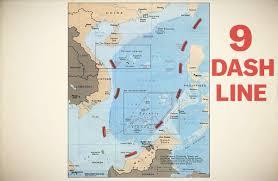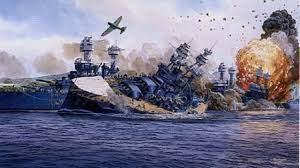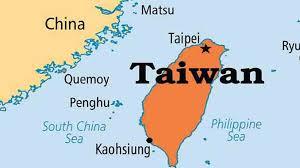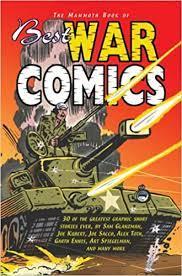It starts with an incident in the South China Sea — in this much remarked 2021 novel by Elliot Ackerman and Admiral James Stavridis (head of the prestigious Fletcher School of Law and Diplomacy at Tufts).

China has been assertively invoking an ancient map, with a “nine-dash line” encompassing this entire vast Pacific region, a claim flagrantly contrary to international law. It encroaches on the legitimate territoriality of several other nations. And grabbing some tiny islands there, China has been heavily militarizing them.
In pointed denial of China’s claims, the U.S. has long been sending “freedom of navigation” ship patrols through these international waters. One such, in 2034, encounters a seeming Chinese fishing boat on fire. This leads to boarding, detaining the crew at gunpoint, and removing a mysterious piece of advanced technology.
By what right would we do such a thing? I was baffled — not for the first time in this book.

Chinese naval vessels quickly arrive. Of the three American ships, two are sunk, the other nearly. It seems all their computer and communications systems were hacked and disabled (never really explained). The incident set up to send us a message: get out of the South China Sea.
Now we dispatch a huge armada, including two carrier groups. Baffling me again. This seemed insane without first figuring out how to counter the cyber-hack that did for the earlier squadron. And our grand armada too is duly sent to the bottom.
Then China swiftly surrounds Taiwan and invades. Not much we can do now to stop them. So instead we nuke a Chinese city. Then they nuke two U.S. cities. And then . . . .
Does this make sense?
There is a villain: the U.S. National Security Advisor, called a “hawk.” Wrong bird. I’d say loon.
Our South China Sea patrols do irk the Chinese. Yet they ultimately do nothing to counter the “facts on the ground” (or water) of China’s tightening grip. So why risk creating an incident there? If China actually has the decisive cyber capability described, why not go straight for Taiwan? That’s the real game.

A quick tutorial for my readers on Mars: Taiwan is an island near China. The anti-communists retreated there after Mao conquered the mainland in 1949. Taiwan became de facto independent and, eventually, a thriving democracy. But China insists Taiwan is a part of it (“One China”), and that everybody pay lip service to this fiction. And that it must be made reality at some point.
In fact this has become a nationalistic obsession for what has become a nation of truculent nationalists. It’s fed by China’s dictator Xi Jinping, seemingly vowing that Taiwan “reunification” will be the capstone of his reign. He is now 67. (Xi is never mentioned in the book.)
America is (more or less) pledged to defend Taiwan’s independence, notwithstanding the “strategic ambiguity” of the “One China” formulation. Our ability to deter China militarily regarding Taiwan is the key test of America’s place in the world order going forward. The Number One global flash point.
Xi’s China is ramping up its military capabilities targeting Taiwan. In the novel, our countering capability evaporates overnight. In the actual world, there seems to be a growing imbalance, in China’s favor. I was very concerned that if Xi was really set on grabbing Taiwan, the time to move was between last November and January, when America’s government was non-functional, unlikely to muster much of a response.
Territoriality is a human mind glitch, a vestige from an evolutionary past when defending a scrap of ground might really matter. In today’s different world, control of territory doesn’t delineate a nation’s destiny. (Adam Smith made that clear in 1776.) China would actually be far better off telling Taiwan: “You want to be independent? Fine; two Chinas are better than one. Let’s be friends and do business.” (In fact, they do a lot of business, notably in computer chips, Taiwan being a vital supplier.) Is this naive? No, rational. The alternative is trying to conquer recalcitrant Taiwanese by force, probably starting a long-term costly and bloody conflict, and disrupting that chip industry China so depends on. While making itself — this nation so prideful — a hated international criminal.
In the novel, China gets Taiwan. But look at the cost. Bully for you, China.

And if America can’t save Taiwan from China’s aggression, then what is achieved by nuking a Chinese city? Putting us on a path to global destruction? The mindless insanity of it all makes this seem like a comic book, not serious future hypothesizing. Indeed, the book doesn’t even bother to explain how such fateful decisions were reached. Maybe because no explanation would have seemed plausible.
Characters pontificate about comeuppance for America’s longtime misplaced global arrogance, blah blah blah. I have little patience for this and am frankly surprised that someone like Stavridis seemingly does. The world is much more complicated than such platitudes imply. And it’s particularly ludicrous maligning America in that way — next to China!
The problem is mainly this book being a novel — following the standard formula for a geopolitical “thriller,” tracing developments through characters. I guess the idea is to make the story “come alive.” But these characters one doesn’t really care about — not with cities being nuked and such. While those cataclysmic events are treated so perfunctorily they have no verisimilitude. The characters react to them, but the world’s other 8 billion people seem nonexistent. There’s virtually no description of the destruction! Without that, how can you write about cities nuked? Just leaving it to our imagination?

I’d have preferred a straightforward history from a post-2034 perspective. That too would have been fiction, of course, but fiction of a different kind. It would have attempted to put the events in context. This novel failed to seriously do that.
